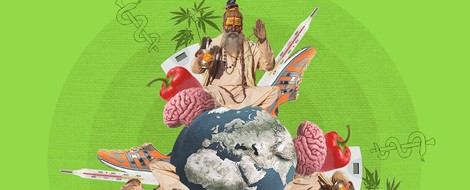Your podcast discovery platform
Curious minds select the most fascinating podcasts from around the world. Discover hand-piqd audio recommendations on your favorite topics.

piqer for: Boom and bust Health and Sanity Global finds Doing Good
Danielle Batist is an experienced freelance journalist, founder of Journopreneur and co-founder of the Constructive Journalism Project. She lived and worked all around the globe and covered global and local stories of poverty, exclusion and injustice. Increasingly, she moved beyond ‘problem-reporting’ to include stories about the solutions she found. She witnessed the birth of the new nation of South Sudan and interviewed the Dalai Lama. She reported for Al Jazeera, BBC and the Guardian and regularly advises independent media organisations on innovation and sustainability. She loves bringing stories to the world and finding the appropriate platforms to do so. The transformation of traditional media fascinates rather than scares her. While both the medium and the message are changing, she believes the need for good storytelling remains.
Five Real Ways To End The War On Drugs
In a series called ‘Solutions Lab’, Positive News shows how "for every problem there is someone, somewhere, working on a solution." In this installment, journalist Lauren Razavi looks at all angles of the drugs problem: from the roots of the drug trade to the way society treats addiction.
More than 30 years since its inception, the US-led ‘war on drugs’ has done little to slow the rate of drug dependence and misuse around the world, and even less to address the causes. According to the UN’s latest World Drug Report (2016), the number of drug dependent adults went up for first time in six years, to 29 million, and drug-related mortality stayed high at around 207,000 deaths reported.
I like this article because it moves beyond statistics and empty promises by politicians. Instead, it highlights root causes and real, tried and tested solutions, including financial incentives for drug growers.
Plant for Peace, for example, convinced 22,000 Afghan farmers that growing horticultural crops would be more lucrative than drugs. These farmers would get around $4,000 per hectare for opium, compared to $6,000 per hectare for pomegranates.
The article also does well at featuring opinions that steer away from the hysteric blank-for-all too often used when citing the dangers of drugs, like that of Johann Hari, author of the book ’Chasing the Scream: The First and Last Days of the War on Drugs’, who helps us regain perspective:
“Most people think that if somebody used heroin for a month, they’d become a heroin addict. The generally held belief is that the chemical mix in heroin is something that the body starts to physically need. Now if I was to get hit by a bus and break my hip, I’d be taken to hospital and given loads of diamorphine, or medical heroin. By the logic above, I should come out of the hospital addicted. But this phenomenon has been studied closely, and addiction rarely happens. Your grandma doesn’t have an operation then come out and try to score on the streets, right?”
Stay up to date – with a newsletter from your channel on Health and Sanity.

Excellent! Nothing to add.